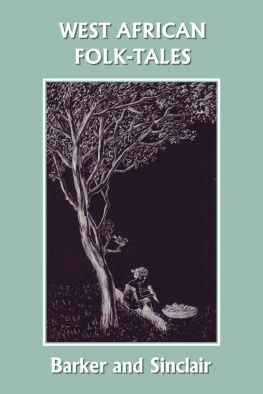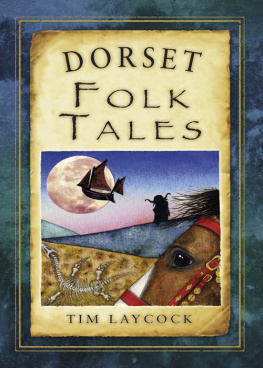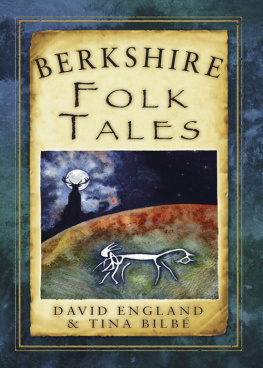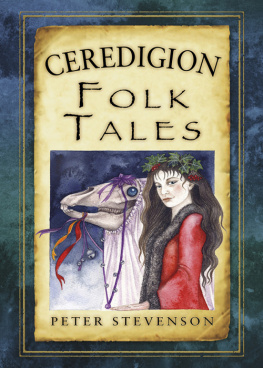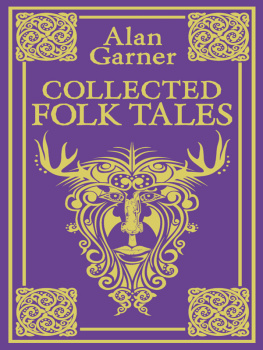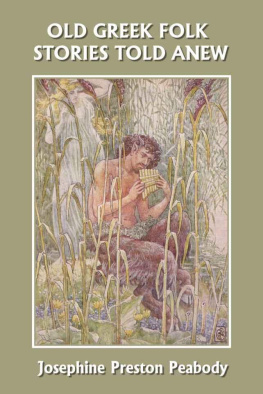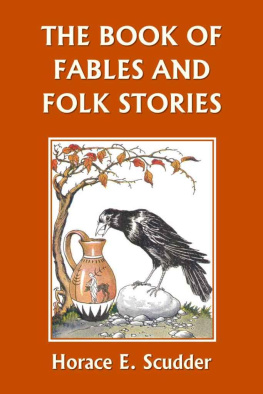West African Folk-Tales
by
William H. Barker
Yesterday's Classics
Chapel Hill, North Carolina
Cover and Arrangement 2010 Yesterday's Classics, LLC
All rights reserved. No part of this book may be reproduced or retransmitted in any form or by any means without the written permission of the publisher.
This edition, first published in 2010 by Yesterday's Classics, an imprint of Yesterday's Classics, LLC, is an unabridged republication of the work originally published by C. M. S. Bookshop in 1917. This title is available in a print edition (ISBN 978-1-59915-231-8).
Yesterday's Classics, LLC
PO Box 3418
Chapel Hill, NC 27515
Yesterday's Classics
Yesterday's Classics republishes classic books for children from the golden age of children's literature, the era from 1880 to 1920. Many of our titles are offered in high-quality paperback editions, with text cast in modern easy-to-read type for today's readers. The illustrations from the original volumes are included except in those few cases where the quality of the original images is too low to make their reproduction feasible. Unless specified otherwise, color illustrations in the original volumes are rendered in black and white in our print editions.
Contents
Anansi, or Spider Tales
Miscellaneous Tales
How We Got the Name "Spider Tales"
I N the olden days all the stories which men told were stories of Nyankupon, the chief of the gods. Spider, who was very conceited, wanted the stories to be told about him.
Accordingly, one day he went to Nyankupon and asked that, in future, all tales told by men might be Anansi stories, instead of Nyankupon stories. Nyankupon agreed, on one condition. He told Spider (or Anansi) that he must bring him three things: the first was a jar full of live bees, the second was a boa-constrictor, and the third a tiger. Spider gave his promise.
He took an earthen vessel and set out for a place where he knew were numbers of bees. When he came in sight of the bees he began saying to himself, "They will not be able to fill this jar""Yes, they will be able""No, they will not be able," until the bees came up to him and said, "What are you talking about, Mr. Anansi?" He thereupon explained to them that Nyankupon and he had had a great dispute. Nyankupon had said the bees could not fly into the jarAnansi had said they could. The bees immediately declared that of course they could fly into the jarwhich they at once did. As soon as they were safely inside, Anansi sealed up the jar and sent it off to Nyankupon.
Next day he took a long stick and set out in search of a boa-constrictor. When he arrived at the place where one lived he began speaking to himself again. "He will just be as long as this stick""No, he will not be so long as this""Yes, he will be as long as this." These words he repeated several times, till the boa came out and asked him what was the matter. "Oh, we have been having a dispute in Nyankupon's town about you. Nyankupon's people say you are not as long as this stick. I say you are. Please let me measure you by it." The boa innocently laid himself out straight, and Spider lost no time in tying him on to the stick from end to end. He then sent him to Nyankupon.
THE BEES FLYING INTO THE JAR.
The third day he took a needle and thread and sewed up his eye. He then set out for a den where he knew a tiger lived. As he approached the place he began to shout and sing so loudly that the tiger came out to see what was the matter. "Can you not see?" said Spider. "My eye is sewn up and now I can see such wonderful things that I must sing about them." "Sew up my eyes," said the tiger, "then I too can see these surprising sights." Spider immediately did so. Having thus made the tiger helpless, he led him straight to Nyankupon's house. Nyankupon was amazed at Spider's cleverness in fulfilling the three conditions. He immediately gave him permission for the future to call all the old tales Anansi tales.
How Wisdom Became the Property of the Human Race
T HERE once lived, in Fanti-land, a man named Father Anansi. He possessed all the wisdom in the world. People came to him daily for advice and help.
One day the men of the country were unfortunate enough to offend Father Anansi, who immediately resolved to punish them. After much thought he decided that the severest penalty he could inflict would be to hide all his wisdom from them. He set to work at once to gather again all that he had already given. When he had succeeded, as he thought, in collecting it, he placed all in one great pot. This he carefully sealed, and determined to put it in a spot where no human being could reach it.
Now, Father Anansi had a son, whose name was Kweku Tsin. This boy began to suspect his father of some secret design, so he made up his mind to watch carefully. Next day he saw his father quietly slip out of the house, with his precious pot hung round his neck. Kweku Tsin followed. Father Anansi went through the forest till he had left the village far behind. Then, selecting the highest and most inaccessible-looking tree, he began to climb. The heavy pot, hanging in front of him, made his ascent almost impossible. Again and again he tried to reach the top of the tree, where he intended to hang the pot. There, he thought, Wisdom would indeed be beyond the reach of every one but himself. He was unable, however, to carry out his desire. At each trial the pot swung in his way.
AGAIN AND AGAIN ANANSI TRIED TO CLIMB THE TREE.
For some time Kweku Tsin watched his father's vain attempts. At last, unable to contain himself any longer, he cried out: "Father, why do you not hang the pot on your back? Then you could easily climb the tree."
Father Anansi turned and said: "I thought I had all the world's wisdom in this pot. But I find you possess more than I do. All my wisdom was insufficient to show me what to do, yet you have been able to tell me." In his anger he threw the pot down. It struck on a great rock and broke. The wisdom contained in it escaped and spread throughout the world.
Anansi and Nothing
N EAR Anansi's miserable little hut there was a fine palace where lived a very rich man called Nothing. Nothing and Anansi proposed, one day, to go to the neighbouring town to get some wives. Accordingly, they set off together.
Nothing, being a rich man, wore a very fine velvet cloth, while Anansi had a ragged cotton one. While they were on their way Anansi persuaded Nothing to change clothes for a little while, promising to give back the fine velvet before they reached the town. He delayed doing this, however, first on one pretext, then on anothertill they arrived at their destination.
Anansi, being dressed in such a fine garment, found no difficulty in getting as many wives as he wished. Poor Nothing, with his ragged and miserable cloth, was treated with great contempt. At first he could not get even one wife. At last, however, a woman took pity on him and gave him her daughter. The poor girl was laughed at very heartily by Anansi's wives for choosing such a beggar as Nothing appeared to be. She wisely took no notice of their scorn.
The party set off for home. When they reached the cross-roads leading to their respective houses the women were astonished. The road leading to Anansi's house was only half cleared. The one which led to Nothing's palace was, of course, wide and well made. Not only so, but his servants had strewn it with beautiful skins and carpets, in preparation for his return. Servants were there, awaiting him, with fine clothes for himself and his wife. No one was waiting for Anansi.

